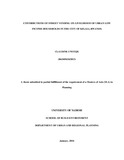Contributions of Street Vending on Livelihood of Urban Low Income Households in the City of Kigali, Rwanda
Abstract
Street vending activities contribute to the livelihoods of millions of people and to national wellbeing at large, especially in developing countries. This sector, however, has been undermined by policymakers who perceive street vending as a liability rather than a potential. Hence street vendors are exposed to various challenges. The need to understand the dynamic of street vending sector better, whose objective is to analyze the contributions of street vending activities on the livelihoods of urban poor in Kigali City, is what prompted this study. Literature review which guided this study showed that the governments of China, Singapore, South Africa, and Tanzania had recognized street vending as a potential contributor to the national economy through job creation, livelihood support for urban poor, and through tax and site rent payment.
This study is based in the City of Kigali, Rwanda. The study used a non-experiment design, a purposive sampling method and participant observations to collect data for this research. Ninety street traders were sampled. Survey questionnaires instruments with both closed and open ended questions were administrated to them. Semi-structured interview with key informants were also undertaken in the city of Kigali, Rwanda.
The study found that failure to secure employment in formal establishments, the need to support family, and dissatisfaction with previous employment conditions were among the major factors that pushed people into street vending business. Data analysis showed that the average daily income generated was Rwf 5092 (USD 7.3) while the average daily expenditure for those interviewed was Rwf 2487 (USD 3.5). Meaning that besides meeting urban poor daily needs, there is a small surplus that is saved for a rainy day and for further investment. On monthly
vi
basis, street vendors generate Rwf 127, 300 (USD 182) which is above the poverty line of Rwanda (Rwf 118, 000 (USD 169) and the salary earned by some of the low cadre employees in the formal sector such as the cleaners (Rwf 20,000/ month; USD 29).
Street vending is not temporary; it is an alternative to job creation and a source of livelihood to the urban poor. Despite, urban authorities still consider street vending activity as an illegal and unproductive activity. The policy makers in Kigali City and the city of Rwanda should take a cue from the governments that have created a conducive environment for street vendors. This could among others entail reviewing urban planning legislations to create space and enabling a favorable working environment for the sector.
Publisher
University of Nairobi
Subject
Street VendingRights
Attribution-NonCommercial-NoDerivs 3.0 United StatesUsage Rights
http://creativecommons.org/licenses/by-nc-nd/3.0/us/Collections
The following license files are associated with this item:


